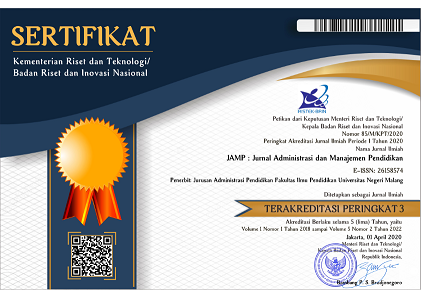PENGARUH PELATIHAN KEWIRAUSAHAAN, DUKUNGAN LINGKUNGAN KELUARGA, MOTIVASI BERPRESTASI DAN SELF EFFICACY TERHADAP MINAT BERWIRAUSAHA MAHASISWA
Abstract
Abstract: This study aims to determine the effect of entrepreneurship training, family support, achievement motivation and self-efficacy on students' interest in entrepreneurship. This research was conducted using a quantitative approach. The research population is students majoring in Educational Administration, FIP UM, with a sample of 203 students. Data analysis using SEM with the help of the AMOS 24.0 program. The results of this study are, (1) entrepreneurship training and family support have a partial and simultaneous effect on student achievement motivation, (2) entrepreneurship training and family support have a partial and simultaneous influence on student self-efficacy, (3) entrepreneurial training , family environment support, achievement motivation and self efficacy have partial and simultaneous influence on student entrepreneurship interest, and (4) entrepreneurship training and family environment support have indirect influence on entrepreneurship interest through student achievement motivation and self efficacy.
Keywords: entrepreneurship training; family environment support; achievement motivation; self-efficacy; interest in entrepreneurship.
Abstrak: Penelitian ini bertujuan untuk mengetahui pengaruh pelatihan kewirausahaan, dukungan lingkungan keluarga, motivasi berprestasi dan self efficacy terhadap minat berwirausaha mahasiswa. Penelitian ini dilakukan dengan menggunakan pendekatan kuantitatif. Populasi penelitian yakni mahasiswa jurusan Administrasi Pendidikan FIP UM, dengan sampel sebanyak 203 mahasiswa. Analisis data menggunakan SEM dengan bantuan program AMOS 24.0. Hasil penelitian ini yakni, (1) pelatihan kewirausahaan dan dukungan lingkungan keluarga memiliki pengaruh secara parsial dan simultan terhadap motivasi berprestasi mahasiswa, (2) pelatihan kewirausahaan dan dukungan lingkungan keluarga memiliki pengaruh secara parsial dan simultan terhadap self efficacy mahasiswa, (3) pelatihan kewirausahaan, dukungan lingkungan keluarga, motivasi berprestasi dan self efficacy memiliki pengaruh secara parsial dan simultan terhadap minat berwirausaha mahasiswa, dan (4) pelatihan kewirausahaan dan dukungan lingkungan keluarga memiliki pengaruh tidak langsung terhadap minat berwirausaha melalui motivasi berprestasi dan self efficacy mahasiswa.
Kata Kunci: pelatihan kewirausahaan; dukungan lingkungan keluarga; motivasi berprestasi; self efficacy; minat berwirausaha.Full Text:
PDFReferences
Abdelkarim, A. (2019). Toward Establishing Entrepreneurship Education and Training Programmes in a Multinational Arab University. Journal of Education and Training Studies, 7(1), 1–9. https://doi.org/10.11114/jets.v7i1.3833.
Adha, M. A., Arifin, I., Maisyaroh, M., Sultoni, S., & Sunarni. (2020). Perbedaan Minat Berwirausaha Berdasarkan Jenis Kelamin Mahasiswa. Jurnal Administrasi Dan Manajemen Pendidikan, 3(3), 208–215. Retrieved from http://journal2.um.ac.id/index.php/jamp/article/view/14265
Adha, M. A., Ariyanti, N. S., Maisyaroh, & Arifin, I. (2020). The Level of Student Career Center Management and Future Career Planning of Students Universitas Negeri Malang: A Descriptive Analysis. The Proceedings of the 4th International Conference of Social Science and Education, ICSSED 2020, August 4-5 2020, Yogyakarta, Indonesia, 1–8. https://doi.org/10.4108/eai.4-8-2020.2302421
Agustia, D. R. (2018). Analisis Siswa SMA Laboratorium UM yang Berwirausaha ditinjau dari Pengetahuan Kewirausahaan, Pendidikan Ekonomi Keluarga, dan Minat Berwirausaha. Jurnal Pendidikan Ekonomi, 11(2), 137–142. https://doi.org/https://dx.doi.org/10.17977/UM014v11i22018p0
Al Ayyubi, W. U., Setyanti, S. W. L. H., & Suroso, I. (2018). The role of self efficacy as mediating the influence of family environment and social environment on student entrepreneur interest. International Journal of Scientific and Technology Research, 7(7), 33–39.
Alhaji, A. (2015). Entrepreneurship Education And Its Impact On Self Employment Intention And Entrepreneurial Self-Efficacy. Journal Humanities And Social Sciences, 3(1), 57–63.
Alma, B. (2013). Kewirausahaan Untuk Mahasiswa dan Umum. Bandung: Alfabeta.
Altinay, L., Madanoglu, M., Daniele, R., & Lashley, C. (2012). The Influenced of Family Tradition and Psychological Traits on Enrepreneurial Intention. International Journal of Hospitality Management, 31(2), 489–499.
Ambad, S. N. A., & Damit, D. H. D. A. (2016). Determinants of Entrepreneurial Intention Among Undergraduate Students in Malaysia. Procedia Economics and Finance, 37(16), 108–114. https://doi.org/10.1016/s2212-5671(16)30100-9
Arifin, I., Maisyaroh, & Adha, M. A. (2020). Seri Penelitian Kuantitatif: Karir Ideal Mahasiswa Di Era Revolusi Industri 4.0. Malang: Universitas Negeri Malang Press.
Ariyanti, N. S., Adha, M. A., Wiyono, B. B., Timan, A., Burhanuddin, & Mustiningsih. (2021). The Effect of Situational Leadership of the Head of Administration, Emotional Quotient and Achievement Motivation on Employee Performance at State University of Malang. AIP Conference Proceedings 2339, 020165. https://doi.org/https://doi.org/10.1063/5.0044894
Arrighetti, A., Caricati, L., Landini, F., & Monacelli, N. (2016). Entrepreneurial intention in the time of crisis: a field study. International Journal of Entrepreneurial Behavior & Research, 22(6), 835–859. https://doi.org/10.1108/IJEBR-12-2015-0326
Astri, W., & Latifah, L. (2017). Pengaruh Personal Attributes, Adversity Quotient dengan Mediasi Self Efficacy Terhadap Minat Berwirausaha. Economic Education Analysis Journal, 6(3), 737–751.
Bagheri, A., & Pihie, Z. A. L. (2010). Role of Family Leadership Development of University Students. World Applied Science Journal, 11(4), 434–442.
Bandura, A. (1977). Self-efficacy: Toward a unifying theory of behavioral change. Psychological Review. https://doi.org/10.1037/0033-295X.84.2.191
Bandura, A. (2001). Social Cognitive Theory: An Agentic Perspective. Annual Review of Psychology. https://doi.org/10.1146/annurev.psych.52.1.1
Byrne, B. M. (2016). Structural Equation Modeling With AMOS: Basic Concepts, Applications, and Programming (3rd ed.). New York: Routledge.
Chaudhary, R. (2017). Demographic factors, personality and entrepreneurial inclination. Education + Training, 59(2), 171–187. https://doi.org/10.1108/ET-02-2016-0024
Creswell, J. C. (2014). Research Design: Qualitative, Quantitative, and Mixed Methods Approaches (4 Edition). London: Sage Publications.
Do, B.-R., & Dadvari, A. (2017). The influence of the dark triad on the relationship between entrepreneurial attitude orientation and entrepreneurial intention: A study among students in Taiwan University. Asia Pacific Management Review, 22(4), 185–191. https://doi.org/https://doi.org/10.1016/j.apmrv.2017.07.011
Ermawati, N., Soesilowati, E., & Prasetyo, P. E. (2017). Pengaruh Need for Achivment Dan Locus of Control Terhadap Intensi Berwirausaha Melalui Sikap Siswa Kelas XII SMK Negeri Se Kota Semarang. Journal of Economic Education, 6(1), 66–74. https://doi.org/https://doi.org/10.15294/jeec.v6i1.14704
Farida, S., Thomas, P., & Prihandono, D. (2020). The Entrepreneurship Interest of XI Grade Marketing Students in Vocational Highschools in Semarang. Journal of Economic Education, 9(1), 19–27. https://doi.org/10.15294/jeec.v8i2.35187
Farrukh, M., Khan, A. A., Khan, M. S., Ramzani, S. R., & Soladoye, B. S. A. (2017). Entrepreneurial intentions: the role of family factors, personality traits and self-efficacy. World Journal of Entrepreneurship, Management and Sustainable Development, 13(4), 303–317. https://doi.org/10.1108/WJEMSD-03-2017-0018
Frinces, Z. H. (2010). Pentingnya Profesi Wirausaha di Indonesia. Jurnal Ekonomi & Pendidikan, 7(1), 34–57.
Garcia, P. R. J. M., Restubog, S. L. D., Bordia, P., Bordia, S., & Roxas, R. E. O. (2015). Career optimism: The roles of contextual support and career decision-making self-efficacy. Journal of Vocational Behavior, 88, 10–18. https://doi.org/https://doi.org/10.1016/j.jvb.2015.02.004
Ghazali, I. (2011). Model Persamaan Struktural Konsep & Aplikasi dengan Program AMOS 19.0. Semarang: Universitas Diponegoro.
Godwin, J. L., Neck, C. P., & D’Intino, R. S. (2016). Self-Leadership, Spirituality, and Entrepreneur Performance: a Conceptual Model. Journal of Management, Spirituality and Religion, 13(1), 64–78. https://doi.org/10.1080/14766086.2015.1122546
Gorgievski, M. J., Stephan, U., Laguna, M., & Moriano, J. A. (2018). Predicting Entrepreneurial Career Intentions: Values and the Theory of Planned Behavior. Journal of Career Assessment, 26(3), 457–475. https://doi.org/10.1177/1069072717714541
Hafizhah, K., Mulyadi, H., & Utama, R. D. H. (2019). Faktor pembelajaran kewirausahaan dan motivasi berwirausaha dalam meningkatkan niat berwirausaha. Journal of Business Management Education (JBME), 4(2), 59–69. https://doi.org/https://doi.org/10.17509/jbme.v4i2.1 7374
Hair, J. F., Black, W. C., Babin, B. J., & Anderson, R. E. (2010). Multivariate Data Analysis (7th Ed.). New Jersey: Pearson Prentice Hall.
Hapsah, R., & Savira, S. I. (2015). Hubungan Antara Self Efficacy dan kreatifitas dengan Minat Berwirausaha. Jurnal Psikologi Teori & Terapan, 5(2), 80–89.
Hasibuan, A. H., Lubis, I., & Rujiman. (2019). The Role of the Management of the Indonesian Young Business (HIPMI) Group in Increasing Business Interests for Young Generation in Padangsidimpuan City. International Journal of Research and Review, 6(11), 327–354.
Hisrich, R. D., Peters, M. P., & Sepherd, D. A. (2016). Entrepreneurship (10th Ed). New York: McGraw Hill.
Hsu, D. K., Burmeister-Lamp, K., Simmons, S. A., Foo, M.-D., Hong, M. C., & Pipes, J. D. (2019). “I know I can, but I don’t fit”: Perceived fit, self-efficacy, and entrepreneurial intention. Journal of Business Venturing, 34(2), 311–326. https://doi.org/https://doi.org/10.1016/j.jbusvent.2018.08.004
In’Nami, Y., & Koizumi, R. I. E. (2013). Structural Equation Modeling In Educational Research : a Primer (M. . Khine, ed.). Rotterdam: Sense Publishers.
Indriyani, I., & Subowo. (2013). Pengaruh Pengetahuan Kewirausahaan dan Lingkungan Keluarga terhadap Minat Berwirausaha melalui Self-Efficacy. Economic Education Analysis Journal, 2(1), 18–23. https://doi.org/https://doi.org/10.15294/eeaj.v8i2.31493
Joseph, I. (2017). Factors Influencing International Student Entrepreneurial Intention in Malaysia. American Journal of Industrial and Business Management, 7, 424–428. https://doi.org/doi: 10.4236/ajibm.2017.74030
Kallas, E. (2019). Environment-Readiness Entrepreneurship Intention Model: The Case of Estonians and the Russian-Speaking Minority in Estonia. SAGE Open, 9(1), 1–15. https://doi.org/10.1177/2158244018821759
Kurniawan, A., Khafid, M., & Pujiati, A. (2019). Pengaruh Lingkungan Keluarga, Motivasi, dan Kepribadian Terhadap Minat Wirausaha melalui Self Efficacy. Journal of Economic Education, 5(1), 100–109.
Ma, L., Cao, Y., Jiang, D., Id, Y. G., & Du, X. (2020). Does ethics really matter to the sustainability of new ventures ? The relationship between entrepreneurial ethics , firm visibility and entrepreneurial performance. PLoS ONE, 15(1), 1–23. https://doi.org/https://doi.org/10.1371/journal.pone.0226920
Maisyaroh, Arifin, I., Ariyanti, N. S., & Adha, M. A. (2020). The Mediating Role of Entrepreneurship Interest on the Effect of Entrepreneurship Education to Digital Startup Preparation in the Digital Age. 1st International Conference On Information Technology And Education (ICITE 2020), 508(Icite), 211–216. https://doi.org/10.2991/assehr.k.201214.238
Memon, J., Rozan, M. Z. A., Ismail, K., Uddin, M., & Daud, D. K. (2015). Mentoring an Entrepreneur: Guide for a Mentor. SAGE Open, 5(1), 1–10. https://doi.org/10.1177/2158244015569666
Mertens, D. M. (2014). Research and Evaluation in Education and Psychology Integrating Diversity With Quantitative, Qualitative, and Mixed Methods (4th ed.). California: Sage.
Mumtaz, B. A. K., Munirah, S., & Halimahton, K. (2012). The Relationship between Educational Support and Entrepreneurial Intentions in Malaysian Higher Learning Institution. Procedia-Social and Behavioral Sciences, 69(24), 2164–2173.
Mustapha, M., & Selvaraju, M. (2015). Personal Attributes, Family Influences, Entrepreneurship Education and Entrepreneurship Inclination among University Students. Kajian Malaysia, 33(1), 155–172.
Nabi, G., Linan, F., Fayolle, A., Krueger, N., & Walmsley, A. (2017). The Impact of Entrepreneurship Education in Higher Education: A Systematic Review and Research Agenda. Academy of Management Learning & Education, 16(2), 277–299. https://doi.org/10.5465/amle.2015.0026
Nurabadi, A. (2015). Peningkatan motivasi berprestasi mahasiswa melalui pendidikan dan latihan kepemimpinan. Jurnal Manajemen Pendidikan, 24. Retrieved from http://ap.fip.um.ac.id/wp-content/uploads/2015/04/11-Ahmad-Nurabadi.pdf
Puni, A., Anlesinya, A., & Korsorku, P. D. A. (2018). Entrepreneurial education, self-efficacy and intentions in Sub-Saharan Africa. African Journal of Economic and Management Studies, 9(4), 492–511. https://doi.org/10.1108/AJEMS-09-2017-0211
Purba, R., & Damanik, S. W. H. (2021). The Effect of Enterprise Characteristics and Self Efficacy on Entrepreneurial Decisions. BASKARA : Journal of Business and Entrepreneurship, 3(2), 49. https://doi.org/10.24853/baskara.3.2.49-57
Purwana, D., & Suhud, U. (2018). Investigating the effect of motivation on entrepreneurial intention : Three different approaches. Problems and Perspectives in Management, 16(2), 200–208. https://doi.org/10.21511/ppm.16(2).2018.18
Rai, N. G. M., Savitri, E. D., & Ratu, A. (2018). Pengembangan Layanan Pusat Karir sebagai Strategi Membentuk Karakter yang Tangguh dalam Membangun Perencanaan Karir Mahasiswa di Era Revolusi Industri 4.0. Prosiding Semateksos 3, 139–148.
Republika.co.id. (2016, May 24). RI Butuh Jutaan Wirausaha Baru. Retrieved from https://www.republika.co.id/berita/koran/ekonomi-koran/16/05/24/o7oh8614-ri-butuh-jutaan-wirausaha-baru/
Ryan, J. C., Tipu, S. A., & Zeffane, R. M. (2011). Need for achievement and entrepreneurial potential : a study of young adults in the UAE. Education, Business and Society: Contemporary Middle Eastern Issues, 4(3), 153–166. https://doi.org/10.1108/17537981111159948
Saunders, M., Lewis, P., & Thornhill, A. (2016). Research Methods for Business Students (7th ed.). London: Pearson Education Limited.
Shen, T., Osorio, A. E., & Settles, A. (2017). Does Family Support Matter? The Influence of Support Factors on Entrepreneurial Attitudes and Intentions of College Students. Academy of Entrepreneurship Journal, 23(1), 24–43. Retrieved from https://www.abacademies.org/articles
Shinnar, R. S., Hsu, D. K., & Powell, B. C. (2014). Self-efficacy, entrepreneurial intentions, and gender: Assessing the impact of entrepreneurship education longitudinally. The International Journal of Management Education, 12(3), 561–570. https://doi.org/https://doi.org/10.1016/j.ijme.2014.09.005
Slameto. (2010). Belajar dan Faktor-Faktor yang Mempengaruhinya. Jakarta: Rineka Cipta.
Solesvik, M. Z. (2017). A Cross-National Study of Personal Initiative as a Mediator between Self-Efficacy and Entrepreneurial Intentions. Journal of East-West Business, 23(3), 215–237. https://doi.org/10.1080/10669868.2017.1306821
Strachan, G. (2018). Can Education for Sustainable Development Change Entrepreneurship Education to Deliver a Sustainable Future? Discourse and Communication for Sustainable Education, 9(1), 36–49. https://doi.org/10.2478/dcse-2018-0003
Sumaryanto, Kasse, T., & Putro, N. H. P. S. (2019). Revisiting the Determinants of Students’ Success in Conducting Creativity Program. Cakrawala Pendidikan, 38(1), 90–103. https://doi.org/10.21831/cp.v38i1.22916
Sun, H., Ni, W., Teh, P., Lo, C., & Tan, G. (2020). The Systematic Impact of Personal Characteristics on Entrepreneurial Intentions of Engineering Students. Frontiers in Psychology, 11(June), 1–15. https://doi.org/10.3389/fpsyg.2020.01072
Thorgren, S., & Wincent, J. (2015). Passion and Habitual Entrepreneurship. International Small Business Journal: Researching Entrepreneurship, 33(2), 216–227. https://doi.org/10.1177/0266242613487085
UM. (2018). Universitas Negeri Malang (UM) Pada Usia 64 Tahun. Malang: Universitas Negeri Malang.
Uslu, B., & Arslan, H. (2017). Faculty’s Academic Intellectual Leadership : The Intermediary Relations With Universities ’ Organizational Components. International Journal of Leadership in Education, 10(April), 1–13. https://doi.org/10.1080/13603124.2016.1278044
Utari, F. D., & Sukidjo. (2020). The Roles of Need for Achievement and Family Environment in Stimulating Entrepreneurial Interest through Self-Efficacy Peran Kebutuhan akan Prestasi dan Lingkungan Keluarga terhadap Minat Berwirausaha melalui Efikasi Diri. Economia, 16(2), 143–160. https://doi.org/https://doi.org/10.21831/economia.v16i2.28725
Utomo, B. B., Mashudi, & Asriati, N. (2014). Pengaruh Pendidikan Kewirausahaan Dalam Keluarga dan Di Sekolah Terhadap Minat Berwirausaha dengan Mediasi Self-Efficacy Siswa Kelas XI. Jurnal Pendidikan Dan Pembelajaran, 3(4), 1–15. Retrieved from http://jurnal.untan.ac.id/index.php/jpdpb/article/view/2531/5339
Vega-gómez, F. I., González, F. J. M., Mera, A. C., & Pérez-mayo, J. (2020). Antecedents of Entrepreneurial Skills and Their Influence on the Entrepreneurial Intention of Academics. Sage Open, 10(2), 1–14. https://doi.org/10.1177/2158244020927411
Vodă, A. I., & Florea, N. (2019). Impact of Personality Traits and Entrepreneurship Education on Entrepreneurial Intentions of Business and Engineering Students. Sustainability (Switzerland), 11(4), 1–34. https://doi.org/10.3390/SU11041192
Walter, S. G., & Block, J. H. (2016). Outcomes of Entrepreneurship Education: An Institutional Perspective. Journal of Business Venturing, 31(2), 216–233.
Widyastuti. (2018). Pusat Karir & Kewirausahaan Mahasiswa ITS PTNBH (Menuju Career Center World Class University). Surabaya: ITS Press.
Wijayanti, L. N. E. R., Sutikno, T. A., & Sukarnati. (2016). Konstribusi Pengetahuan Kewirausahaan, Pengalaman Prakerin, Dan Kreativitas Terhadap Kesiapan Berwirausaha. Jurnal Pendidikan: Teori, Penelitian, Dan Pengembangan, 1(7), 1364—1375-1375. https://doi.org/10.17977/jp.v1i7.6565
Wirawan, M. J. (2014). Internalisasi Jiwa Kewirausahaan Pada Anak. Jakarta: Kencana.
Wright, S. L., Perrone-McGovern, K. M., Boo, J. N., & White, A. V. (2014). Influential Factors in Academic and Career Self-Efficacy: Attachment, Supports, and Career Barriers. Journal of Counseling and Development, 92(1), 36–46. https://doi.org/https://doi.org/10.1002/j.1556-6676.2014.00128.x
Zeffane, R. (2013). Need for Achievement, Personality and Entrepreneurial Potential: a Study of Young Adults in the United Arab Emirates. Journal of Enterprising Culture, 21(1), 75–105. https://doi.org/https://doi.org/10.1142/s0218495813500040
DOI: http://dx.doi.org/10.17977/um027v4i32021p272
Refbacks
- There are currently no refbacks.
Copyright (c) 2021 Endra Ubaidillah

This work is licensed under a Creative Commons Attribution-ShareAlike 4.0 International License.


This work is licensed under a Creative Commons Attribution-NonCommercial-ShareAlike 4.0 International License.









12.png)